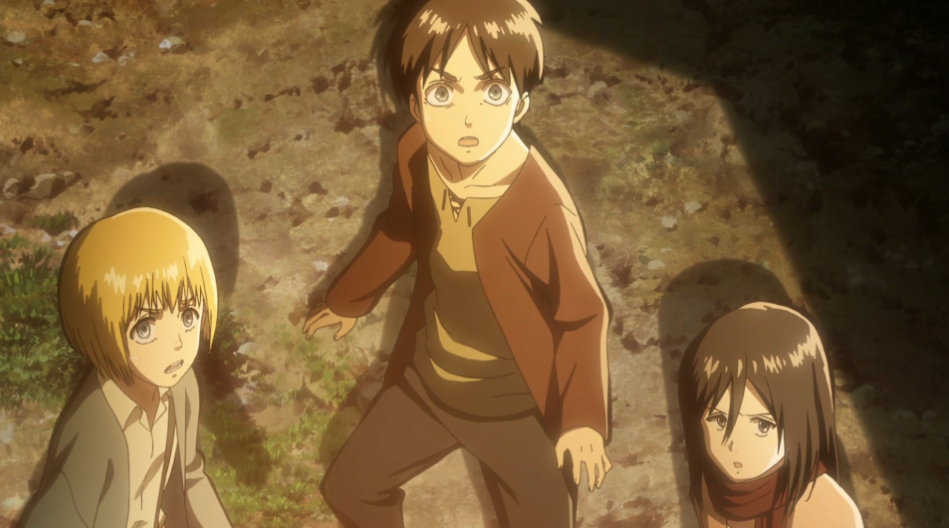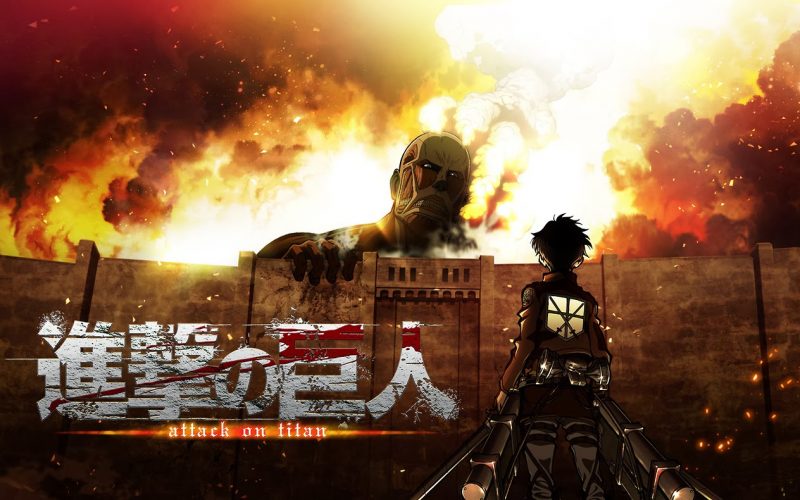Attack on Titan: Season 1 Part 1 (2013) – Review.
Attack on Titan, or Shingeki No Kyojin as it’s known in Japan, is heading into its third season this year, five years since the series launched back in 2013. Adapting a manga that is currently still ongoing, the first season consists of twenty-five episodes split across two parts for the Blu Ray release (although a later collection compiling both parts is available too). For the sake of discretion, I’ve only seen the Japanese language, English subtitled version of the series, and won’t be commenting on the English Dub released by Funimation.
With such a sporadic release schedule (Season Two aired in 2017), it’s a testament to the story and to the minds behind it that it maintains an avid fan-base both in its home region and among western fans of Japanese animation. It captured the zeitgeist of the time, with a young adult cast but a mature and gritty sensibility that explores the current cultural curiosity toward fictional futures that wipe the slate clean and throw characters into post-apocalyptic settings. It’s a series driven by, above all else, mystery and misery. The world is crafted with considerable ease despite some hiccups early on, and the mythology grows deeper as the series expands in episode count.
 One hundred years after the Titans appeared and wiped out most of the human race, the series follows a boy named Eren Yeager (voiced by Yuki Kaji), whose life, along with the lives of many others, is drastically changed when the Colossal Titan appears outside the towering walls that house what remains of human civiilization, and breaks through it effortlessly. In pour an innumerable number of giants that take the appearance of humans but are many times larger, and they begin devouring the people below like insects. This event instigates the first thirteen episodes of the series which make up Part One. It’s a devastating way to kick things off and by the fifth episode the show either has you by the throat or has lost you to its madness. The first five episodes are nothing we haven’t seen before as our three main characters become recruits for humanity’s remaining army before everything descends into chaos.
One hundred years after the Titans appeared and wiped out most of the human race, the series follows a boy named Eren Yeager (voiced by Yuki Kaji), whose life, along with the lives of many others, is drastically changed when the Colossal Titan appears outside the towering walls that house what remains of human civiilization, and breaks through it effortlessly. In pour an innumerable number of giants that take the appearance of humans but are many times larger, and they begin devouring the people below like insects. This event instigates the first thirteen episodes of the series which make up Part One. It’s a devastating way to kick things off and by the fifth episode the show either has you by the throat or has lost you to its madness. The first five episodes are nothing we haven’t seen before as our three main characters become recruits for humanity’s remaining army before everything descends into chaos.
The central trio is interesting enough, if not yet the most multi-dimensional group of characters. Eren is immediately cast as the underdog. He’s not as skilled as Mikasa Ackerman (Yui Ishikawa), his adoptive sister, nor anywhere near so as Armin Arlert (Marina Inoue), he and Mikasa’s childhood friend. He is however, and as noted in the show, driven by severe internal motivation and his anger toward the titan drives him to achieve things he may not otherwise have the capabilities to achieve. He both inspires and aggravates his companions in the training camp, though he’s not quite the loose cannon that the show at times might want you to think.
When it’s revealed that he has a strange and unprecedented ability to take the form of a titan during the overlong “Struggle for Trost” storyline, it’s epic and fascinating but fails to pause even for a moment to let its character ponder over the fact that he’s become what he most loathes. The training camp and the drama that ensues between the characters is a tried and true formula, and at times can feel a little forced. That said, it promises us that the show will willingly stop and let us explore character beats even if it’s set a precedent for an action-oriented pace going forward. Apart from the nitpick above, the characters are all given their due attention.
 Mikasa is both the most interesting character in the show, and the most disappointing. Her backstory, as shown in the episode “The World the Girl Saw: The Struggle for Trost, Part 2”, adds immense depth to the relationship she has with her adoptive brother. But her all-encompassing devotion to Eren defines her, at least in this initial run of episodes, so much so that it gets in the way of any hope of further developing a unique personality. I must add in that I haven’t read the manga, and there may well be a reason for Mikasa’s heightened dedication to Eren, but it nevertheless gets in the way of the character. Still, she provides some of the show’s most thrilling and uplifting moments. Armin meanwhile, is the narrator of the series and his intelligence becomes an immense asset when his gift for strategy proves the difference between life and death. Still, the combat is something he’s unprepared for, and so the carnage takes a severe toll on him. Eren, Mikasa, and Armin work well as a combination, even if there’s untapped potential from a developmental perspective for at least two of them.
Mikasa is both the most interesting character in the show, and the most disappointing. Her backstory, as shown in the episode “The World the Girl Saw: The Struggle for Trost, Part 2”, adds immense depth to the relationship she has with her adoptive brother. But her all-encompassing devotion to Eren defines her, at least in this initial run of episodes, so much so that it gets in the way of any hope of further developing a unique personality. I must add in that I haven’t read the manga, and there may well be a reason for Mikasa’s heightened dedication to Eren, but it nevertheless gets in the way of the character. Still, she provides some of the show’s most thrilling and uplifting moments. Armin meanwhile, is the narrator of the series and his intelligence becomes an immense asset when his gift for strategy proves the difference between life and death. Still, the combat is something he’s unprepared for, and so the carnage takes a severe toll on him. Eren, Mikasa, and Armin work well as a combination, even if there’s untapped potential from a developmental perspective for at least two of them.
The mammoth “Struggle for Trost” arc runs for nine of the thirteen episodes here, and while the scenarios represented are captivating at times, the show spins its wheels toward the end before finding its drive again in the final two episodes. It’s fascinating that the show takes so much power away from the characters and gives them very little to relish in apart from basic survival. The Colossal Titan returns five years since he broke through the first wall, and breaks down the next inner gate. Suddenly there’s not that much left of humanity’s final sanctuary. The new recruits, so soon after completing their training, are thrown into combat while they’re all still green. And they’re caught unprepared for the reality of the situation.
The show is uncompromising in its frequent killing of characters, though there are so many that they’re easy to lose track of. One particular and prominent character, Jean Kirstein (a fellow recruit who thinks little of Eren, voiced by Kishou Taniyama), is struck hard by the discovery of a friend’s mangled body in the aftermath of the battle. The depth of the discovery is reliant on its affect on Jean rather than the off-screen death itself. Likely, that’s the point, as Jean points out later on in the series, not everybody gets to have a heroic death. Still, until I was shown a flashback of the character much later on, I could not recall who he was.
 The episodes that drag do so by taking away from the immediacy of the situation. While the retreat and the subsequent cornering of Eren soon after his titan ability is discovered allows for downtime and renewed drama simultaneously, it slows the pace down to a crawl by forcing such a short amount of time to stretch out into multiple episodes. For better or worse, the show is adept at ending episodes on pulsating cliffhangers that make it near impossible to simply turn the television off. For that, it can feel as though we’re being cheated of some meat on the bone by way of content. Fortunately these episodes are rare and I don’t believe it ever dovetails into filler. After its brief inhale, the show accelerates to a mid-season finale that’s less about repelling the enemy and claiming victory and more about basic damage control.
The episodes that drag do so by taking away from the immediacy of the situation. While the retreat and the subsequent cornering of Eren soon after his titan ability is discovered allows for downtime and renewed drama simultaneously, it slows the pace down to a crawl by forcing such a short amount of time to stretch out into multiple episodes. For better or worse, the show is adept at ending episodes on pulsating cliffhangers that make it near impossible to simply turn the television off. For that, it can feel as though we’re being cheated of some meat on the bone by way of content. Fortunately these episodes are rare and I don’t believe it ever dovetails into filler. After its brief inhale, the show accelerates to a mid-season finale that’s less about repelling the enemy and claiming victory and more about basic damage control.
Directed by Tetsurō Araki, Part 1 introduces some curious characters, some forgettable ones, and a central trio full of potential and with room to grow. The story’s world is alluring enough that, despite the doom and gloom of its premise, we’re desperate to learn more. It devotes so much time to the effects of war as it does on the war itself, and its unpredictability is an invaluable asset. It’s easy to forgive the occasional flaw when there’s so much passion and dedication being put into adapting the story in the best possible way, and it’s abundantly clear that this is only table setting for the meal to come.
Film ’89 Verdict – 8/10

